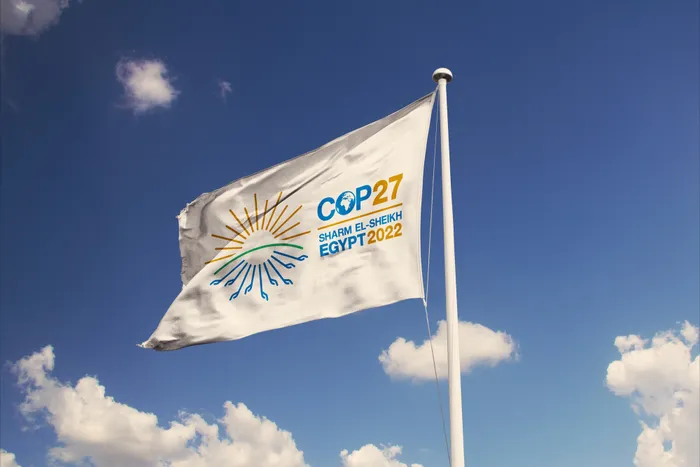Africa disproportionately suffering from climate change

The 2022 United Nations Climate Change Conference COP27 held from November 7-18 in Sharm El-Sheikh, Egypt. Picture: Rafael Henrique / SOPA Images/Sipa USA
File Credit: REUTERS/Thomas Peter
By Bertha Moteane
It is a decade since Durban hosted the United Nations (UN) Climate Change Conference and the world’s leading environmental event returns to Africa, this time in Egypt. So much has changed since COP17 and COP27, yet the political landscape is reminiscent.
Back in 2011, the “Durban deal” was about deliverance and finally beginning to address how to balance the needs and responsibilities across the developed and developing world. But has there been significant political progress and changes to help target the hosting continent a decade on?
As we head to Sharm El-Sheikh next month it is the moment to shine the spotlight on the fact Africa is disproportionately suffering from climate change impacts that it did not cause.
Yet, many countries in the Global North continue to indulge in planet-harming consumption patterns, as well as failing to deliver on financial commitments on loss and damage and dedicate funding for sustainable adaptation practices.
It is also the moment for countries to show progress on their commitments, made at last year’s meeting, towards renewing efforts to urgently deliver the objectives of the Paris Agreement.

Four Paws asserts that to achieve this transformation and stay within the 1.5°C goal, an urgent and drastic reduction in the number of animals we farm and consume is needed. This is estimated to be about 70% by 2030 in the Global North – that produces and consumes more animal products – and 50% by 2040 globally and would be supported through higher welfare and environmentally sound farming practices and a shift to plant-based diets.
Historically, United Nations climate COPs have tended to be about coal and cars, whereas food and farming have been neglected, both in terms of mitigation and adaptation. Yet, food systems are responsible for a third of global greenhouse gas emissions and limiting global warming by 1.5°C will not be achieved without significant changes to the food system.
This year, hopefully, marks a turning point. Four Paws is co-hosting the first-ever pavilion on food systems in COP history, Food4Climate. We aim to put farm animals, diet change and food system transformation firmly on the UN Agenda.
One way the pavilion will address the role of food in climate action is to really draw attention to demand-side policies. A meat-based diet is responsible for twice the amount of greenhouse gas emissions as a plant-based diet.
Therefore, changes to food production and to diets would have a huge impact on the overall global emissions released each year. The Intergovernmental Panel on Climate Change has made it crystal clear; overconsumption of animal-based products needs to be part of climate action. As well as the long-awaited conclusions of the Koronivia Joint Work on Agriculture, the Egyptian presidency has dedicated an official day of programming on Agriculture and Adaptation.
Four Paws will be advocating that as well as mitigating greenhouse gases and adapting to climate change, systemic food system transformation can bring positive co-benefits to the environment, animal welfare and human well-being and contribute to sustainable development outcomes.
Shifting to better farming systems such as agroforestry or where there is the practice of integrating trees, forage, and the grazing of domesticated animals in a mutually beneficial way is advised. This uses the principles of managed grazing and will also make farms more resilient to climate change. We cannot afford to go down the road of “sustainable intensification”.
Farming systems must work with nature and animals and not be reliant on false technological fixes that so often increase the suffering of animals. Animal welfare concerns in Africa are frequently complicated and connected to socio-economic, political, religious, and cultural aspects but as a previous host nation 11 years ago, South Africa knows the need for further transition and progress on the political issue of our time.
Four Paws urges South Africa to take seriously the impact of livestock farming and the prevalence of meat consumption on the environment with regard to greenhouse gas emissions.
We hope that the presence of Food4Climate pavilion at COP27 in Egypt will be the first step as a catalyst for change and will empower governments to pave the path for the transformation of their country’s food systems.
Moteana is the Campaigns Officer at Four Paws.